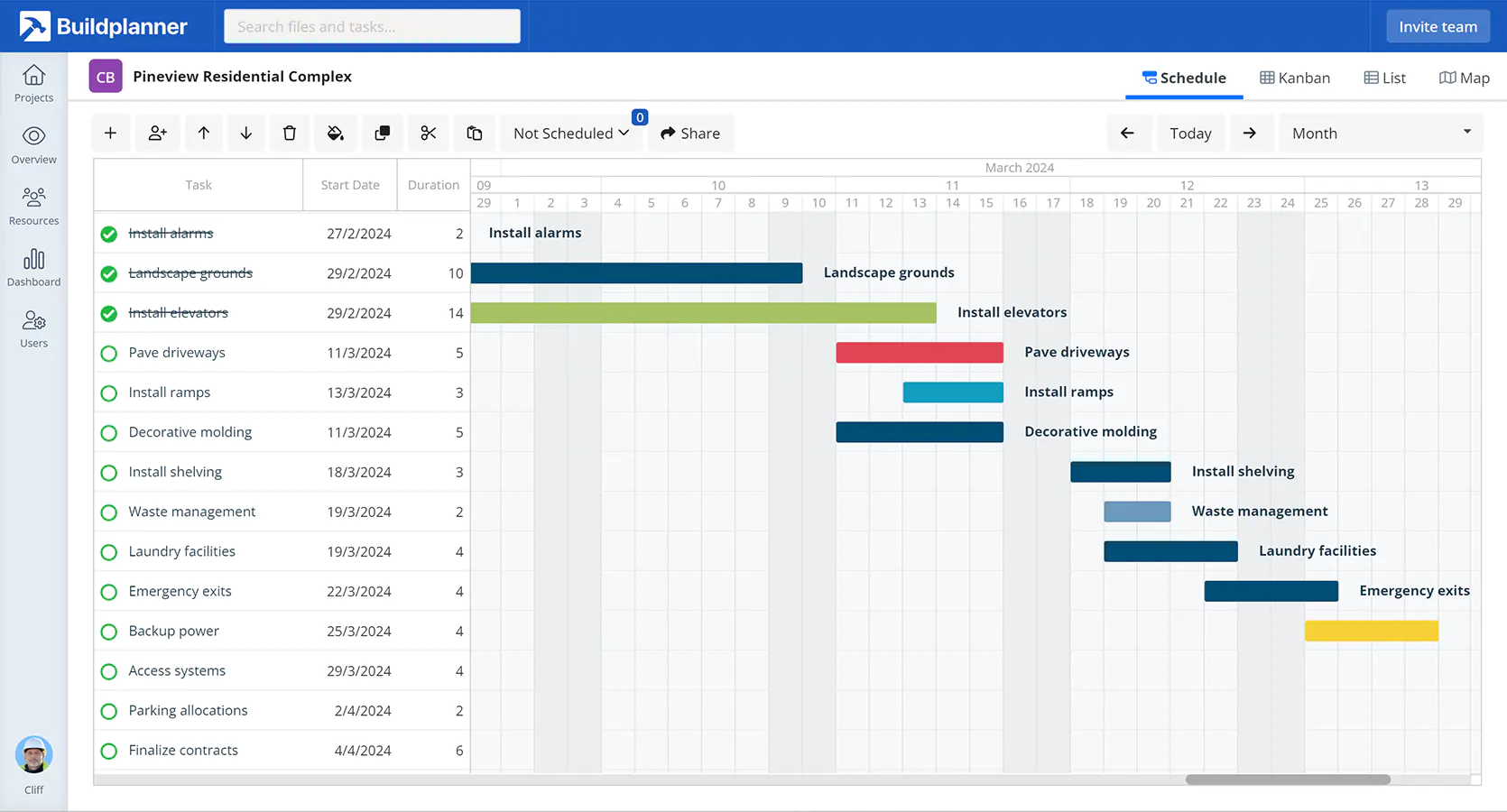Trello for Construction Management
Trello is a project management tool that offers a simple and intuitive approach to organizing tasks and collaborating with team members. While it may not be specifically designed for the construction industry, contractors can leverage its features for construction project management.
Can Trello be used for Construction Management?
Trello is a project management tool for everyone. That means that it’s not designed for construction per se, but ofcourse it can be a good choice for some contractors.
Task Management: Trello’s boards, lists, and cards system can be used by contractors to break down construction projects into manageable tasks. Each task can be represented as a card, and these cards can be organized into lists that represent project phases, such as planning, construction, and inspection.
Scheduling: While Trello doesn’t offer traditional Gantt charts, contractors can use due dates, labels, and card dependencies to create a visual project schedule. This approach provides a simplified but effective way to track project timelines and task dependencies.
Resource Allocation: Contractors can assign team members to specific tasks by adding them to cards. This feature helps in resource allocation and ensures that team members know their responsibilities.
Collaboration: Trello encourages collaboration through comments, attachments, and mentions. Contractors can use this feature to discuss project details, share important documents, and keep team communication centralized.
How Much Does Trello Cost for Contractors?
Trello offers pricing plans suitable for contractors and construction teams:
Free Plan: Trello offers a free plan that provides basic features and is suitable for small construction projects or individual contractors.
Trello Business Class: Priced at $12.50/user/month (when billed annually), this plan offers advanced features like custom fields, advanced checklists, and priority customer support. It’s suitable for small to medium-sized construction teams.
Trello Enterprise: The Enterprise plan provides custom solutions for larger organizations and construction companies. Pricing varies based on specific needs and can be obtained through Trello’s sales team.
What are the Downsides of Using Trello in Construction?
While Trello is a flexible tool, there are certain limitations contractors should be aware of:
Simplified Scheduling: Trello’s scheduling features are not as robust as dedicated construction scheduling tools like Buildplanner. Contractors may find it challenging to create complex project schedules.
Limited Reporting: Trello offers basic reporting features, but it may not provide the in-depth analytics and reporting capabilities needed for complex construction projects.
Integration Dependency: For advanced features like time tracking, contractors may need to rely on third-party integrations, which can add complexity to the toolset.
What are the strengths of using Trello for Construction?
Trello offers several strengths that make it a valuable choice for contractors:
Simplicity: Trello’s user-friendly interface makes it accessible to contractors with varying levels of technical expertise, ensuring quick adoption and minimal training.
Flexibility: Contractors can adapt Trello to their specific project management needs by customizing boards, lists, and cards to match their workflows.
Collaboration: Trello’s collaboration features enable contractors to keep all project-related communication, documents, and updates in one place, promoting effective teamwork.
Affordability: The free plan and competitively priced Business Class plan make Trello an attractive option for contractors looking to manage their projects on a budget.
Scalability: Trello can accommodate both individual contractors and larger construction teams, making it a versatile choice.
Alternatives to Trello for Construction
While Trello is a viable option for contractors, it’s essential to explore alternatives to ensure it aligns with your specific project management needs:
- Buildplanner: Buildplanner is a easy and fast resource and construction scheduling tool that also has kanban board, lists and powerful gantt charts.
Procore: Procore is a comprehensive construction project management software designed specifically for the construction industry, offering features for scheduling, financial management, and collaboration.
Buildertrend: Buildertrend is another dedicated construction management platform that provides scheduling, communication, and client management tools.
Smartsheet: Smartsheet offers a versatile work management platform with features that can be customized for construction project management, including scheduling and resource allocation.
ProjectManager.com: ProjectManager.com specializes in project management, with construction-focused tools for scheduling and resource management.
In conclusion, Trello can be a valuable tool for contractors looking for a simple and flexible approach to construction project management. Its user-friendly interface, collaboration capabilities, affordability, and scalability make it an attractive choice. However, contractors should consider its limitations and explore alternatives, especially for complex construction projects that require advanced scheduling and reporting features.
Office Address:
182 High Street North
London E6 2JA
United Kingdom
